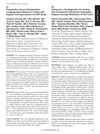Tafluprost, a Prostaglandin F2α Analog, Has Therapeutic Potential for Androgenic Alopecia through Modulation of Hair Cycle
April 2016
in “
Plastic and reconstructive surgery. Global open
”
tafluprost prostaglandin F2α analog androgenic alopecia telogen phase anagen phase depilation-induced anagen phase human scalp hair mouse vibrissa follicles human dermal papilla cells angiogenesis inflammatory cytokines interleukin-1ß catagen keratinization human keratinocytes hair growth cycle hair loss hair follicles inflammation hair growth hair cycle

TLDR Tafluprost could be a potential treatment for hair loss by promoting hair growth phase changes.
The study investigated the potential of tafluprost, a prostaglandin F2α analog, for treating androgenic alopecia by affecting the hair growth cycle. Topical tafluprost was applied to C57BL/6 mice either in the telogen phase or after depilation-induced anagen phase using seven different concentrations. The results showed that tafluprost promoted the conversion from telogen to anagen phase most effectively at a concentration equivalent to that of a commercial eye drop, with hair protrusion observed significantly earlier (day 19.6 ± 0.7) compared to the control group (day 42). In depilation-induced anagen mice, tafluprost extended the early anagen phase but did not affect the mid-late anagen phase. In vitro studies with human scalp hair and mouse vibrissa follicles, as well as human dermal papilla cells, showed no acceleration of hair growth or cell proliferation. Additionally, tafluprost did not promote angiogenesis in a chick chorioallantoic membrane assay. However, microarray analysis revealed that tafluprost downregulated inflammatory cytokines and interleukin (IL)-1ß, which induces catagen, in human dermal papilla cells, while upregulating genes related to keratinization in human keratinocytes. The study concluded that tafluprost has therapeutic potential for androgenic alopecia by modulating the hair cycle, particularly by inducing anagen and extending the early anagen phase.




